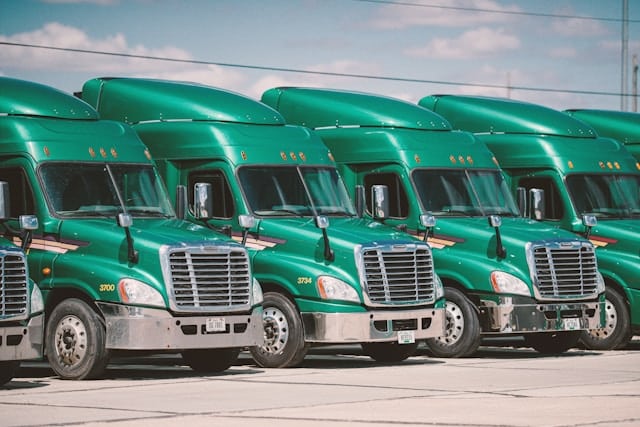For fleet managers, gone are the days of having to guess the best course of action or decision to make. With fleet analytics, data-backed insights and information can quite literally be at your fingertips, no matter where you may be. That’s something worth celebrating and taking advantage of. But, AI fleet analytics entails a lot of different technologies, so what exactly do we mean when we use the term?
We’re going to use this space to uncover what fleet management analytics involves, and how fleet data analytics are pivotal to the success of fleet management teams everywhere.
What is Fleet Analytics?
Fleet analytics is defined as the science of collecting data from fleets in order to process it and draw useful information from the data. In order to collect data, Internet of Things (IoT) sensors and AI-speech tools can be used, for example. Both of these mechanisms capture otherwise unstructured data and deliver it to a centralized system for processing and use in real-time.
Fleet analytics is made possible because of these three main components:
Hardware
Physical devices, like IoT sensors, are attached to the vehicles to monitor functions like tire pressure, battery ignition, and exhaust, to name a few.
Communication Systems
Communication systems include: GPS, Bluetooth, mobile networks, and any other communication channels to relay data, messages, and information. Consider these to be like the messenger.
Analytics
Cloud platforms collect and store data to apply to algorithms in order to derive insights. These analytics are what power informed decision making capabilities. You can think of this as like a mathematician working their magic.
Types of Fleet Analytics
There are different types of fleet analytics that can be applied for various intended outcomes.
Here are the two main categories:
- Fleet management analytics: Fleet management analytics are performed to optimize operations and resource allocation. This could include route optimization algorithms and fuel consumption data, to give an idea.
- Fleet safety analytics: As you likely guess, fleet safety analytics are those that are geared towards enhancing safety measures and risk mitigation. For example, factors that are measured could be a driver’s behavior in terms of speeding, harsh braking, or stop sign violations.
By applying these two categories of analysis, you can cover the most important considerations when working within the fleet industry, namely efficiency and safety.
Benefits of AI-Powered Fleet Analytics
Every industry you can think of that deals with big data is turning to artificial intelligence (AI) to assist in being able to transform raw data into insights in a timely manner.
Using AI saves time, reduces costs, and increases accuracy. Instead of having to rely on humans to perform manual, time-consuming, and error-prone tasks, AI tools expedite the processes, connect data in real-time, and perform analysis without delays.
Here are a few of its key benefits:
Increased Efficiency
With AI in action, fleet managers have data at their fingertips to optimize route efficiency, schedule maintenance, and boost performance. Through the use of sensors, predictive analytics, and data collection, managers can track fuel efficiency, road conditions, hazards, and routes to achieve operational effectiveness. Every little bit of savings goes a long way and is multiplied by the fleet’s number of vehicles, so even small improvements have a lasting and large effect.
Improved Decision-making
Rather than having to guess what decisions to make without access to data, AI provides data-driven insights that support informed decision-making capabilities. Fleet managers can see where it’s possible to cut costs, adjust routes, and even optimize driver schedules to improve performance and safety.
Enhanced Safety and Risk Management
Drivers have to remain focused, but there’s no doubt that after long hauls, they can be extremely tired and easily distracted. With AI solutions, it’s possible to monitor drivers in real-time and even gain access to their driving behaviors. By being able to pinpoint fatigue, speeding, or dangerous driving, fleet managers can plan more strategically and correct issues before incidents occur.
AIola’s Voice Analytics in Fleet Management
When you think of fleet management data analytics, it’s typical to think of IoT devices, telematics, and data management platforms. But, don’t count out the strength and power of AI-enabled speech solutions like aiOla.
If you’re wondering, “What is aiOla and how does it help in fleet management?” we have a lot to share! aiOla is a first-of-its-kind speech-powered solution that can understand business-specific jargon in any accent, acoustic environment, and language. Since at least 50% of business processes rely on industry-specific vocabulary, it’s paramount to have a speech solution that can actually decipher these keywords to transform voices into actions.
When it comes to fleet automation and management, aiOla delivers process completion capabilities and voice analytics– all your frontline workers have to do is talk through their existing processes. Consider pre-operational truck inspections, for example. When a global shipping courier implemented aiOla, they were able to cut their inspection time per vehicle from 15 minutes to 60 seconds, representing an 85% time savings!
Using aiOla is easy because you don’t have to change how you do anything at all. aiOla simply digitizes your current processes and enables your team to talk through their workflow, all the while the tool will structure otherwise lost and unstructured speech data. By using this data to complete actions, aiOla also adds another level of purpose to your business by capturing critical data so you can leverage it to make smart business decisions.

The Road to Fleet Efficiency is Clear
Fleet analytics is no longer a nice-to-have addition for fleet managers and operators. It is a must-have component to support efficiency, safety, and strategic decision-making capabilities.
aiOla’s handy solution enables fleet managers to improve productivity, capture usable data, and reduce risks. It’s easy-to-use, works anywhere, and most importantly, understands your most critical business-specific jargon and acronyms. Want to experience aiOla in action, and experience how quickly you can leverage AI-powered fleet analytics and speech AI to achieve operational excellence? Get in touch so we can take you on the ride of a lifetime.


